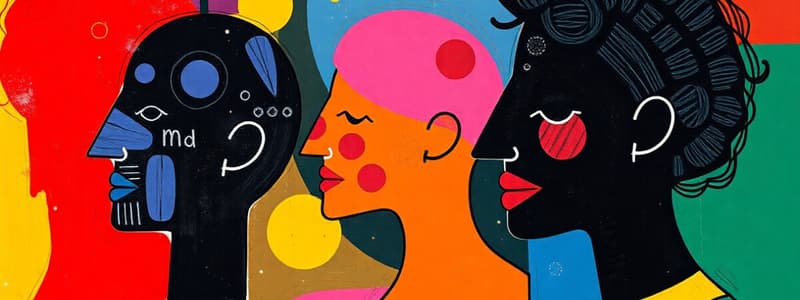Podcast
Questions and Answers
What is the term used for the hierarchical organization of individuals within a society based on wealth, power, and prestige?
What is the term used for the hierarchical organization of individuals within a society based on wealth, power, and prestige?
- Culture
- Social Structure
- Stratification (correct)
- Socialization
Which major theorist focused on social order and collective consciousness?
Which major theorist focused on social order and collective consciousness?
- Karl Marx
- Émile Durkheim (correct)
- Herbert Spencer
- Max Weber
What is the process by which individuals learn and internalize the values and norms of their society?
What is the process by which individuals learn and internalize the values and norms of their society?
- Cultural Transmission
- Socialization (correct)
- Acculturation
- Cognitive Dissonance
Which term describes the original materials from the time being studied in historical research?
Which term describes the original materials from the time being studied in historical research?
What is the term for the authority of a state to govern itself without external interference?
What is the term for the authority of a state to govern itself without external interference?
Study Notes
Sociology
- Definition: Study of society, social institutions, and social relationships.
- Key Concepts:
- Culture: Shared beliefs, norms, and values of a group.
- Social Structure: Organized patterns of relationships and social arrangements.
- Socialization: Process by which individuals learn and internalize the values and norms of their society.
- Stratification: Hierarchical organization of individuals within a society based on factors like wealth, power, and prestige.
- Major Theorists:
- Émile Durkheim: Focused on social order and collective consciousness.
- Max Weber: Emphasized understanding social action and the role of bureaucracy.
- Karl Marx: Analyzed class struggle and economic factors in societal change.
History
- Definition: Study of past events, particularly in human affairs.
- Key Concepts:
- Chronology: The arrangement of events in the order of their occurrence.
- Historical Context: The background and circumstances surrounding an event.
- Primary Sources: Original materials from the time being studied (e.g., documents, artifacts).
- Secondary Sources: Interpretations and analyses of primary sources (e.g., textbooks, articles).
- Historiography: Study of how history is written and the different perspectives historians bring to their work.
Polity
- Definition: The form or process of political organization or governance.
- Key Concepts:
- Political Systems: Structures of governance, such as democracy, monarchy, authoritarianism.
- Political Ideologies: Sets of beliefs about politics (e.g., liberalism, conservatism, socialism).
- Sovereignty: Authority of a state to govern itself without external interference.
- Civil Society: Organizations and institutions that exist independently from the government.
- Political Participation: Ways in which citizens engage in political processes (e.g., voting, activism, public discourse).
Sociology
- Study of society, social institutions, and social relationships.
- Culture: Encompasses shared beliefs, norms, and values that bind groups together.
- Social Structure: Refers to established patterns of relationships and arrangements within a society.
- Socialization: The lifelong process through which individuals internalize societal values and norms.
- Stratification: Describes the hierarchical organization of society based on wealth, power, and prestige.
- Émile Durkheim: Pioneered concepts of social order and collective consciousness to understand societal cohesion.
- Max Weber: Focused on social action and the influence of bureaucracy on society.
- Karl Marx: Examined the impact of class struggle and economic factors on social change.
History
- Study dedicated to understanding past events and their significance in human affairs.
- Chronology: Involves organizing events in the sequence they occurred.
- Historical Context: Essential background and circumstances that shape understanding of events.
- Primary Sources: Original documents and artifacts from the time period studied, providing firsthand insights.
- Secondary Sources: Analyses and interpretations based on primary sources, offering evaluations of historical events.
- Historiography: Investigates how history is written, highlighting diverse perspectives of historians.
Polity
- Encompasses the forms and processes of political organization and governance.
- Political Systems: Different structures of governance include democracy, monarchy, and authoritarianism.
- Political Ideologies: Frameworks of beliefs guiding political perspectives, such as liberalism, conservatism, and socialism.
- Sovereignty: The ultimate authority of a state to govern itself, free from external control.
- Civil Society: Comprises organizations and institutions that operate independently of state governance.
- Political Participation: Various ways citizens are involved in the political process, including voting, activism, and public discourse.
Studying That Suits You
Use AI to generate personalized quizzes and flashcards to suit your learning preferences.
Description
Dive into the essential concepts of sociology, including culture, social structure, and stratification. This quiz also explores the contributions of major theorists such as Émile Durkheim, Max Weber, and Karl Marx. Test your understanding of how these elements shape society.




